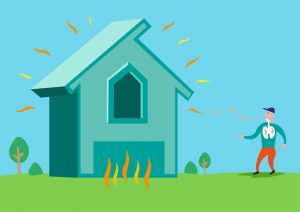 Denver7 ABC released a news story just over a month ago, in mid-January, stating that Colorado has particularly high levels of radon. Unfortunately, even though homes in Colorado are especially likely to contain dangerous level of radon, so many Coloradans have never even heard of this deadly gas. That’s why Colorado officials speak out about the dangers of radon each year.
Denver7 ABC released a news story just over a month ago, in mid-January, stating that Colorado has particularly high levels of radon. Unfortunately, even though homes in Colorado are especially likely to contain dangerous level of radon, so many Coloradans have never even heard of this deadly gas. That’s why Colorado officials speak out about the dangers of radon each year.
So why is Colorado at risk for radon?
“It’s largely because radon is a byproduct of the decay of uranium and it exists in our soil everywhere because we live in a highly mineralized state,” Warren Smith, a spokesperson for the Colorado Department of Public Health, told Denver7 in January.
What is Radon?
Radon is a gas that has no taste and no smell. It also has no color, so it cannot be detected with any of your senses. As if that wasn’t bad enough, radon is also radioactive, and it is a byproduct of other radioactive solids like uranium. As the solid form of uranium decays, it turns into other dangerous elements like radon. The end point for uranium is another toxic element, lead. While on the journey to lead, one of the elements that uranium turns into is radon.
Radon is very dangerous, and has been linked to lung cancer in several definitive studies. Scientists believe that deaths caused by lung cancer could be reduced by 2-4%, or 5,000 deaths a year, simply by lowering radon levels in homes to the standard of the EPA’s action level.
Why Is It In Colorado?
Because radon is a gas, it seeps up from the uranium-rich rock beneath the Rocky Mountains. The Colorado Department of Public Health and Environment spokesperson, Warren Smith, warns that highly mineralized states like Colorado are especially prone to levels of radon that exceed the EPA’s suggested limits. As a result, Denver radon testing is an essential service for any homeowners in the region. Radon seeps into Colorado homes through cracks in the foundation, around electrical outlets and pipes, and even through the water supply. The only way to know there is too much radon in your home is to test for it.
Radon Testing Denver Colorado
It’s estimated that about 50% of homes in Colorado have radon levels higher than the EPA action level recommendation, which is 4.0 pCi/L. Although radon cannot be detected by human senses alone, it is actually detectable to a high degree of accuracy with the proper instruments. If you don’t know whether your home is at risk for radon, and if you want to avoid undue risk of lung cancer, then investing in Denver radon testing is a wide course of action.
It is very important to know what the levels of radon are in your home, especially if you live in Colorado. We offer some of the best radon testing Denver Colorado has to offer, so keep your family safe and let us test your home today.

Recent Comments